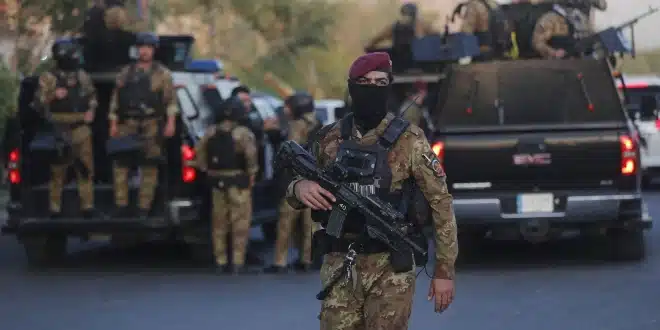Tensions flared in southern Baghdad on Sunday as a confrontation between Iraqi security forces and pro-Iran armed fighters left three people dead—including a police officer—and several others wounded. The violence stemmed from an armed takeover of a government facility, highlighting the persistent volatility posed by powerful militia groups operating within the country.
Armed Raid Sparks Deadly Exchange
According to Iraq’s Interior Ministry, the violence broke out when gunmen stormed a local branch of the agriculture ministry located in a southern district of the capital. Responding police forces were met with live fire, leading to casualties among the security personnel. At least one police officer was confirmed dead, while multiple injuries were reported.
A separate security official, speaking anonymously, stated that a civilian was also among the dead. Meanwhile, a member of Kataeb Hezbollah, a prominent Iran-backed faction, reported that one of their fighters was killed and six others injured in the confrontation.
Kataeb Hezbollah Allegedly Involved
Although Iraq’s Joint Operations Command formally announced the detention of 14 suspects affiliated with Hashed al-Shaabi, internal sources suggested that the armed men involved in the raid were specifically linked to Kataeb Hezbollah, a faction within the Hashed network known for operating autonomously at times.
Sources familiar with the matter explained that Kataeb Hezbollah had been at odds with a recent government appointment at the agriculture ministry office, which is located in a zone under the group’s significant influence. Though no official motive has been declared, the disagreement over the appointment is believed to have triggered the raid.
A representative of Kataeb Hezbollah acknowledged their involvement but said the group “does not want to escalate” the situation further and would allow the judicial process to take its course.
Political and Security Implications
While Iraq has made strides toward stability in recent years, armed skirmishes remain frequent, often fueled by power struggles, unresolved rivalries, and the lingering influence of non-state actors. The country is governed by a coalition known as the Coordination Framework, an Iran-aligned alliance comprising Shiite political parties and key Hashed al-Shaabi factions.
Prime Minister Mohammed Shia al-Sudani has called for an investigation into Sunday’s events and is under pressure to assert control over factions that, although officially part of the state security apparatus, sometimes act independently and beyond the reach of civilian oversight.
The Interior Ministry released a statement following the incident, affirming that it “will not tolerate any group seeking to impose its will by force or endanger state institutions.”
A Familiar Pattern
Iraq’s complex security landscape—still shaped by decades of war, sectarian conflict, and foreign influence—remains vulnerable to sudden outbursts of violence. While this latest incident was confined to a localized dispute, it illustrates a broader challenge: the tug-of-war between state authority and factional power, particularly in areas where armed groups hold sway.
With ongoing political negotiations and internal rivalries simmering beneath the surface, incidents like these are a reminder that Iraq’s path to genuine stability remains fraught with challenges. As the investigation unfolds, the government faces renewed scrutiny over its ability to rein in paramilitary groups that often blur the line between official forces and independent militias.


